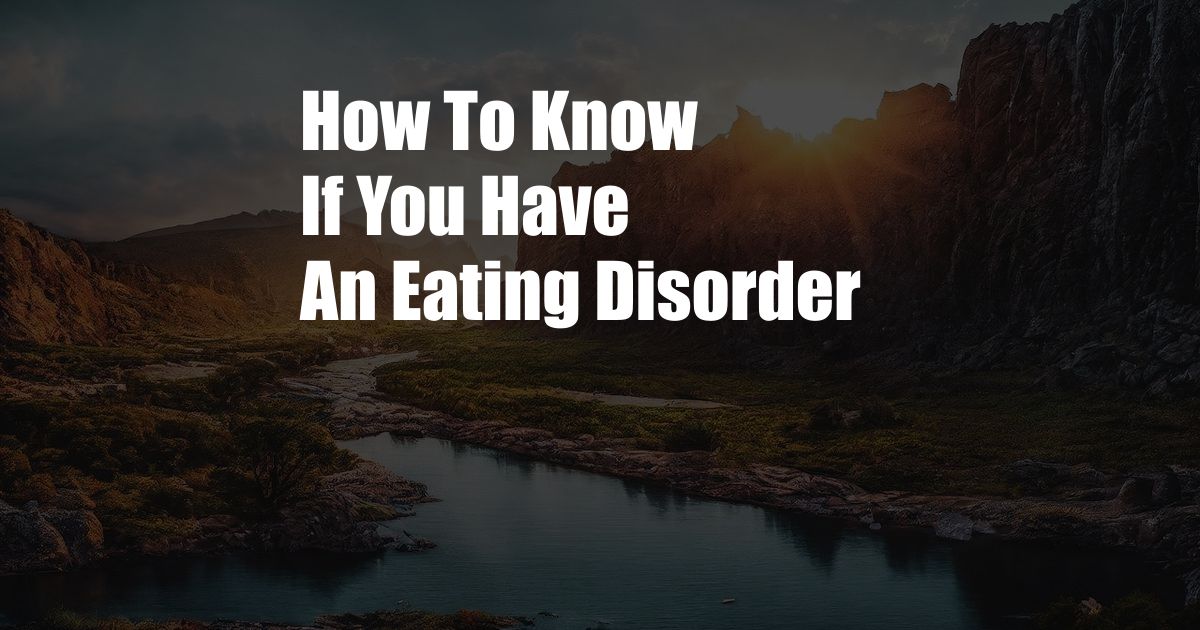
How to Know if You Have an Eating Disorder
Eating disorders are serious mental illnesses that can have devastating consequences. They are characterized by an unhealthy obsession with weight, food, and body image. People with eating disorders may severely restrict their food intake, binge eat, purge (vomit or use laxatives), or exercise excessively. These behaviors can lead to a range of physical and mental health problems, including malnutrition, organ damage, and depression.
Eating disorders are a complex and often misunderstood issue. Many people with eating disorders do not realize they have a problem, and they may be ashamed to seek help. It is important to be aware of the signs and symptoms of eating disorders so that you can get the help you need.
The Different Types of Eating Disorders
There are several different types of eating disorders, including anorexia nervosa, bulimia nervosa, and binge-eating disorder. Anorexia nervosa is characterized by an intense fear of gaining weight, a distorted body image, and severe food restriction. Bulimia nervosa is characterized by binge eating followed by purging. Binge-eating disorder is characterized by recurrent episodes of binge eating without purging.
The Signs and Symptoms of Eating Disorders
The signs and symptoms of eating disorders can vary depending on the type of disorder. However, some common signs and symptoms include:
- Extreme weight loss or gain
- Preoccupation with weight, food, and body image
- Unusual eating habits, such as skipping meals, hiding food, or eating in secret
- Excessive exercise
- Purging behaviors, such as vomiting, using laxatives, or taking diet pills
- Mood changes, such as depression, anxiety, or irritability
- Physical health problems, such as fatigue, dizziness, or irregular heartbeat
If you are concerned that you or someone you know may have an eating disorder, it is important to seek professional help immediately. Eating disorders are serious illnesses, but they can be treated with therapy, medication, and support.
The Latest Trends and Developments in Eating Disorder Treatment
The field of eating disorder treatment is constantly evolving. New therapies and medications are being developed to help people with eating disorders recover. One of the most promising new treatments is called family-based therapy (FBT). FBT involves the entire family in the treatment process. The family learns how to support the person with the eating disorder and how to help them develop healthy eating habits.
Another new treatment for eating disorders is called cognitive-behavioral therapy (CBT). CBT helps people with eating disorders to identify and change the negative thoughts and behaviors that contribute to their disorder. CBT has been shown to be effective in treating both anorexia nervosa and bulimia nervosa.
Tips and Expert Advice for People with Eating Disorders
If you are struggling with an eating disorder, there are a number of things you can do to help yourself. First, it is important to seek professional help. A therapist can help you to understand your eating disorder and develop a treatment plan. Second, it is important to connect with others who are struggling with eating disorders. There are many support groups and online forums where you can meet other people who understand what you are going through. Third, it is important to focus on your recovery. Eating disorders are serious illnesses, but they can be overcome. With the right help and support, you can recover from your eating disorder and live a healthy, fulfilling life.
Expert Advice
Here are some expert tips for people with eating disorders:
- Don’t be afraid to seek help. Eating disorders are serious illnesses, but they can be treated. A therapist can help you to understand your eating disorder and develop a treatment plan.
- Connect with others who are struggling with eating disorders. There are many support groups and online forums where you can meet other people who understand what you are going through.
- Focus on your recovery. Eating disorders are serious illnesses, but they can be overcome. With the right help and support, you can recover from your eating disorder and live a healthy, fulfilling life.
FAQ on Eating Disorders
Here are some frequently asked questions about eating disorders:
Q: What causes eating disorders?
A: Eating disorders are caused by a complex combination of biological, psychological, and social factors. People with eating disorders may have a genetic predisposition to the disorder, or they may have experienced trauma or abuse. Eating disorders can also be triggered by dieting or trying to lose weight.
Q: Are eating disorders curable?
A: Eating disorders are serious illnesses, but they can be treated. With the right help and support, people with eating disorders can recover and live healthy, fulfilling lives.
Q: How can I help someone with an eating disorder?
A: If you are concerned that someone you know may have an eating disorder, the best thing you can do is to encourage them to seek professional help. You can also offer your support and understanding. Let them know that you are there for them and that you care about them.
Conclusion
Eating disorders are serious illnesses, but they can be overcome. With the right help and support, people with eating disorders can recover and live healthy, fulfilling lives. If you are struggling with an eating disorder, please seek professional help. There is hope for recovery.
Are you interested in learning more about eating disorders? Check out the following resources:
- National Eating Disorders Association (NEDA): https://www.nationaleatingdisorders.org/
- National Association of Anorexia Nervosa and Associated Disorders (ANAD): https://anad.org/
- The Renfrew Center: https://renfrewcenter.com/